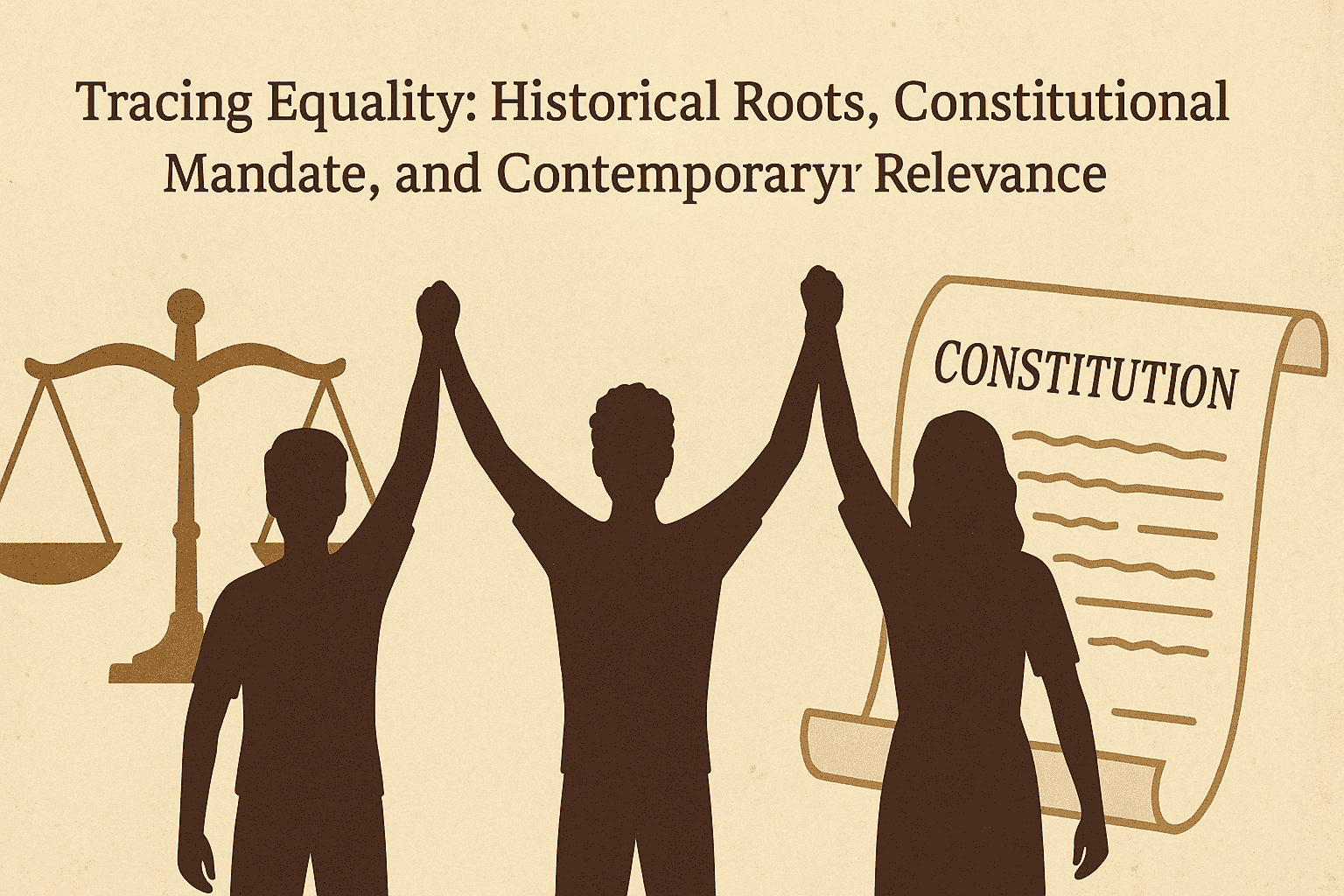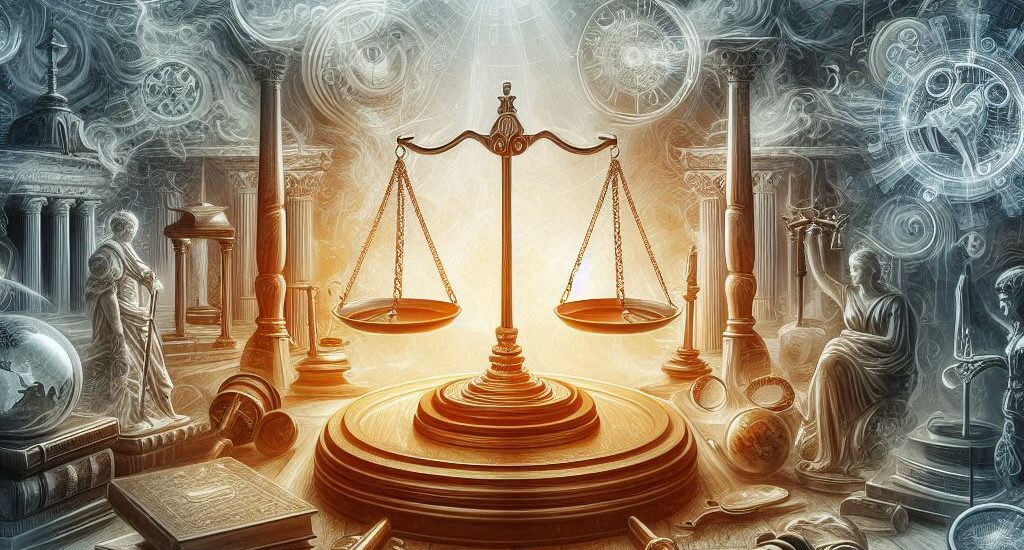



There are three pillars of government: the executive, legislature, and judiciary; these act independently but are interdependent on each other for the smooth functioning of the government in the country. Article 50 of the constitution provides for the separation of powers, and the separation of powers is part of the Basic Structure Doctrine stated in Kesavananda Bharati v. State of Kerala. The framers clearly granted the judiciary the authority of substantive review under Articles 14, 19, and 21 of the constitution, paving the stage for substantive due process. Article 14 guarantees equality before the law and equal protection under the law, and it allows for interpretation through a lens to evaluate the arbitrariness of the laws and decide on substantive questions of law. Article 19 allows for the interpretation of reasonableness within the parameters of the restrictions given by Articles 19(2) to 19(6) rather than the legislation itself, and Article 21 is a broad provision that outlines the procedure.
The excess of political exigency in 1975, as well as the subsequent failure of courts to preserve civil rights during that time, resulted in courts legitimately rejecting the framers’ original goal and opting for judicial activism instead. The idea of fairness and non-arbitrariness establishes the cornerstone of due process in India, which is invoked by courts through judicial interpretation, despite the fact that constitutional framers consciously resort to procedures established by law while making the Indian constitution. Article 21 explicitly provides the procedure established by law, but the court interpreted this term as per the need and invoked the powers of judicial review, interpreted the article in Maneka Gandhi v. Union of India, and implicitly implanted the doctrine of due process of law.
In the A.K.Gopalan case, it was asserted by the court that the phrase procedure established by law in Article 21 is not equivalent to the due process clause’s procedural aspect since the latter phrase was deliberately avoided by the constitutional makers. The Constituent Assembly debates Article 15 of the Indian Constitution, which became Article 21. Kazi Syed Karimuddin, a member, argued that retaining the words “According to procedure established by law” would lead to injustice. The Advisory Committee on Fundamental Rights endorsed Karimuddin’s opinion, stating that no person should be deprived of life or liberty without due process of law. He cautioned about the court’s inability to challenge the unfair and malafide decision of authority if they comply with the procedure established by law. Therefore, he suggested replacing “except according to procedure established by law” with “without due process of law.”
However, B.N. Rao, the Constituent Assembly’s Constitutional Advisor, thought that due process would give the courts undue authority. He declared: “The courts will, in effect, have a veto on legislation exercisable at any time and at the instance of any litigant, manned by an irremovable judiciary not so sensitive to public needs in the social or economic sphere as representatives of a periodically elected legislature.”
The term ‘without due process of law’ originates from the American Constitution and has a long history in Anglo-American law. It implies a fundamental principle of justice, requiring fair and just legal provisions. The term has no specific definition in either the English or American Constitutions, but its meaning can be found through examining its antecedents.The due process clause ensures a fair trial in terms of both procedure and content. The process must adhere to the law and be appealing to the person’s civilized conscience and society. Additionally, it guarantees a substantively fair trial, meaning that the legislation itself should be reasonable and appealing to the community’s civilized conscience.
However, the term procedure established by law indicates that a law passed by the legislature or other relevant authority is only enforceable if the proper protocol has been strictly adhered to. “Procedure established by law” refers to a procedure that is outlined in a statute or that is mandated by state law. As a result, in order for interference with someone’s life or personal liberty to be justified, there must be a law, it must be a genuine law, and the legal process must have been rigorously adhered to. The executive authorities shall violate Article 21 of the meddle with the life or personal liberty of the individual in the absence of any legal procedure supporting the deprivation of personal liberty. Property was not covered by Article 21; it was limited to life and personal liberty. However, the framers of the Constitution were wary of sweeping judicial review, especially in the case of liberty. They had made provisions for preventive detention, which had only been applied in times of emergency, like in times of war or insurrection. It was thought that the precise wording “procedure established by law” would preclude the possibility of a judicial veto of such legislation. In the process, they unintentionally turned the important fundamental right to life and liberty into a right that is solely reliant on the legislature’s generosity.
Shri K.M. Munshi, Shri Alladi Krishnaswami Ayyar, and Mr. Z.H. Lari all supported the concept of ‘without due process of law’, arguing that it would strike the balance between individual liberty and social control. They emphasized the importance of incorporating such a clause in the Constitution for both individual liberty and proper legislature functioning.
Dr. B.R. Ambedkar has expressed his disagreement on the terms ‘procedure established by law’ and ‘due process’. He believes that due process of law must be present in the article, otherwise it would be nugatory. However, he also believes that the existing phraseology is sufficient for the purpose. The question of ‘due process’ raises the relationship between the legislature and the judiciary. In a federal constitution, the judiciary is always allowed to decide whether a law passed by the legislature is ultra vires or intra vires, based on the powers granted by the constitution to the legislature. The ‘due process’ clause would give the judiciary the power to question the law made by the legislature on the grounds of whether it is in keeping with certain fundamental principles relating to individual rights. This would allow the judiciary to declare the law invalid if it violates certain fundamental principles. The question now raised by the introduction of the phrase ‘due process’ is whether the judiciary should be given the additional power to question laws made by the state on the grounds of violating certain fundamental principles.Regarding the legitimacy of the legislature in enacting legislation, there are two points of view. One point of view contends that laws that would violate fundamental rights should never be made by the legislature, while another contends that one can never trust the legislature because of their propensity for making mistakes, their intense emotions, their political bias, and other factors. Although it is not ideal, the judiciary is able to challenge legislative decisions. Dr. Ambedkar contends that laws that contradict fundamental values impacting the life and liberty of an individual could still be made by a legislature crowded with political parties. In addition, he casts doubt on the ability of a few gentlemen to decide which laws are good or bad based on their own conscience, bias, or prejudices, whether they are serving on the federal or Supreme Court. Finally, The House of Representatives decided on the matter, adopting the Clause drafted by the Drafting Committee, rejecting ‘due process’. Article 21 provided for the arrest of any person under any circumstances, while Article 22 imposed limitations on the legislature.
In Gopalan case, the court rejected the idea of converting ‘due processes’ into ‘procedure established by law’ under Article 21. The majority ruled that the term ‘law’ in Article 21 cannot be equated to the principles of natural justice, as they are vague, indefinite, and abstract. The court interpreted the term ‘procedure established by law’ to mean the procedure as outlined in an enacted law. However, Fazl Alli, J. disagreed, stating that the principles of natural justice should be incorporated into Article 21.The Supreme Court has delinked Article 19 from Articles 21 and 22, leading to anomalous results for quite some time .The Supreme Court in Kharak Singh struck down an administrative direction authorizing ‘domiciliary visits’ of police authorities into the houses of habitual offenders as violative of Article 21. The majority declined to investigate the matter in accordance with Article 19 (1)(d), adopting the Gopalan case approach.
However, the separate but concurring judgment of Subba Rao laid the foundation for an integrated approach of fundamental rights in future cases.In Satwant Singh Sawhney v. Union of India, the minority judgment of Subba Rao became the majority judgment. The case dealt with the withdrawal of passport and travel privileges from an import/export businessman by the authority. The Ministry of External Affairs impounded the passport of Sawhney on the ground that he had violated conditions of the import license granted to him by the Indian Government. Sawhney challenged the action on the grounds that it infringed his fundamental rights under both Article 21 and Article 14 of the Constitution. The beginning of this new trend was strengthened by the Cooper case, which challenged the constitutional validity of the Banking Companies (Acquisition and Transfer of Undertakings) Act, 1969. The Supreme Court quashed the legislation as violative of Articles 14, 19, and 31. The apex court observed that ‘law’ under Article 21 should be read with Articles 19, and 14, whenever necessary to strengthen the right to personal liberty and overcome the weakness of the guarantee of ‘procedure established by law’ , making inference that procedure established by law needs to be justifiable.
In the history of the Indian legal system, Maneka Gandhi v. Union of India40 is a landmark case that can be categorized as both pre- and post-Maneka Gandhi. Maneka Gandhi contested the constitutionality of Passport Act of 1967 Section 10(3)(c), which gave the government the right to seize a person’s passport if doing so would serve the public good. She argued that this clause grants the authorities the discretion to seize the passport without allowing for a hearing, which is an unfair procedure that violates the rights to equality and individual liberty. The petitioner’s arguments that the method established under Article 21 should be equitable, fair, and reasonable were upheld by the seven-judge panel of the highest court.Articles 14 and 19 of the Constitution should be applied to any further testing of this process. According to Krishna Iyer, J., the law defining the process for taking away someone’s life and personal freedom under Article 21 cannot be any kind of process; instead, it must be one that is neither arbitrary, unfair, nor illogical. As a result, Article 21’s interpretation of the due process idea states that “procedure established by law” must be reasonable, fair, and just.
V.N. Shukla; Constitution of India 11th ed. P.199.
S.P. Sathe; “Judicial Activism in India Transgressing Borders and Enforcing Limits” 2nd (ed.) Oxford University press.
CAD VOL. 7, P. 1000.
3 INDIA CONST. ASSY. DEB. 842-43
Kesavananda Bharti v. State of Kerala; AIR 1973 SUPREME COURT 1461, 1973 4 SCC 225.
A.K. Gopalan v. State of Madras, A.I.R. 1950 S.C. 27.
M.P. JAIN, INDIAN CONSTITUTIONAL LAW 1183 (Nagpur: Lexis Nexis Butterworths Wadhwa, 6th 2010).
Kharak Singh v. State of U.P., A.I.R. 1963 S.C. 1295.
Satwant Singh Sawhney v. Union of India(1967) 3 S.C.R. 525
R.C. Cooper v. Union of India, A.I.R. 1970 S.C. 564.
Maneka Gandhi v. Union of India A.I.R. 1978 S.C. 597.